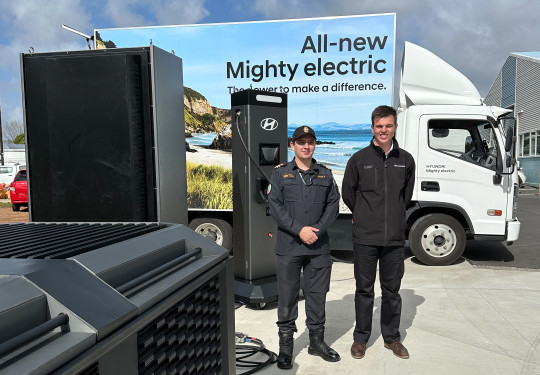Hydrogen fuel in Navy’s future
A marine engineer officer is exploring the possibilities of hydrogen power generation as a future means of ship propulsion.
05 December, 2024
Lieutenant Isaac Wade has published Applications of Hydrogen Technology to the NZDF and RNZN in the RNZN Professional Journal of New Zealand, which explores potential uses for hydrogen technology in Defence.
He was recently assisted in a Defence Science and Technology collaboration with Hyundai NZ, showcasing a Hyundai portable power generation system with an Electical Vehicle charging capability.
The system consists of two fuel cells capable of producing 160 kilowatts of power, and is ideal for remote applications. Such a system could be a viable alternative to the diesel generators currently in use.
“What excites me about hydrogen technology is, firstly, it’s sustainable. It could make New Zealand more resilient in terms of fuel infrastructure, and give us some fuel independence.”
A portable generation system has remote applications, especially in Humanitarian and Disaster Relief situations.
“Such a device could form a part of a deployable sustainable system for supporting relief efforts. A hydrogen electrolyser powered by portable renewable energy systems such as wind and solar could produce hydrogen.
“This system could be converted to a permanent installation to provide additional resilience to the local community. This reduces emissions and decreases some of the logistics with respect to fuel supply in remote areas.”
For the Navy, he sees multiple avenues.
“We could look at a dual fuel system on ships, with hydrogen and diesel, or we could have only fuel cells, where we generate hydrogen ashore using water and electrolysis. Hydrogen goes in one end, oxygen from the air in another, producing water and power.
“A future surface combatant, could be a pure hydrogen fuel cell ship. The earliest opportunity for such technology would be the replacement for HMNZS Aotearoa.”
It’s not new technology; other navies have utilised hydrogen fuel technology since the 1990s, he says. There are some hydrogen fueled vehicles in New Zealand, mainly in the heavy transport sector, as well as buses.
LT Wade, who joined the Navy in 2021, did his honours dissertation at The University of Waikato on renewable energy technologies.
“New Zealand used to be a world leader in hydrogen technology, but we’ve fallen behind. There are great opportunities that exist with the technology, and I believe it will get to the point where it will be the norm.”
